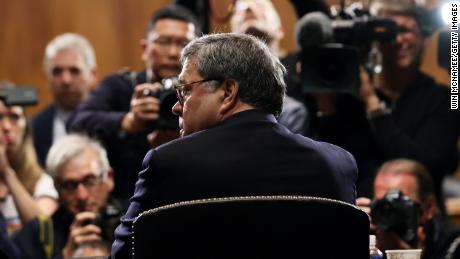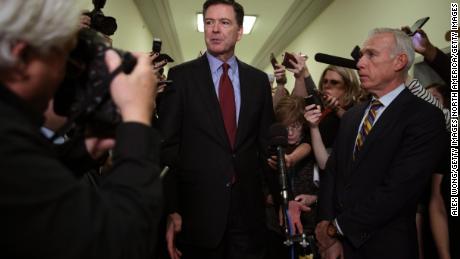Washington (CNN)With the Russia investigation over, there's a new conflict consuming Washington: Attorney General William Barr versus special counsel Robert Mueller.
The tension between the two men -- Barr, the public face of the Justice Department, and Mueller, an outwardly silent figure who's spoken publicly only through written documents -- has been building for weeks and was on full display Wednesday as the attorney general testified in the Senate Judiciary Committee.
Barr's final two minutes of testimony before the Judiciary Committee prompted him to call Mueller's March 27 letter criticizing Barr's release of a four-page summary of the special counsel's report "a bit snitty." At other points of his testimony, Barr undercut the special counsel's team of prosecutors and rejected Mueller's decisions and reasoning.
"I think it was probably written by one of his staff people," Barr said about the March 27 letter. Separately, when Barr was asked if Mueller's team of prosecutors were "the best and the brightest," the attorney general responded, "Not necessarily."
Special counsel office spokesman Peter Carr declined to comment on who wrote the March 27 letter, which was signed by Mueller, or to respond to Barr's gripes.
In addition to the fight over Barr's rollout of the report, Barr and Mueller have also diverged on their legal approaches, especially related to the obstruction of justice investigation into President Donald Trump. Barr's testimony Wednesday made that even clearer.
Legal drama
Barr dinged Mueller on Wednesday for three of his prosecutorial choices: That Mueller didn't make a decision on obstruction, that Mueller continued to investigate obstruction and that Mueller rejected the Trump personal attorneys' legal reasoning on an obstruction case.
"We were frankly surprised that they were not going to reach a decision on obstruction," Barr testified. "We did not understand exactly why the special counsel was not reaching a decision, and when we pressed him on it, he said that his team was still formulating the explanation."
It was the "very purpose -- the function he was carrying out," Barr added.
Barr leaned into an argument he had made to the Justice Department in writing before he became attorney general: that the President shouldn't be investigated for obstruction. He said he disagreed with Mueller's work in a broader sense.
"I think that if he felt he shouldn't go down the path of making a traditional prosecutive decision, then he shouldn't have investigated," Barr said. "That was the time to pull up."
Yet Mueller describes in the report his reasoning for investigating Trump -- and continuing to investigate him. The obstruction investigation wasn't merely a political distraction, Mueller says, and the special counsel sought to preserve what happened while "memories were fresh and documentary materials were available," according to the report.
Mueller reasoned that even if a president cannot be prosecuted while in office, he or she can still commit crimes, noting a prosecution could come later, once the President has left office, or Congress may consider the findings.
Half of Mueller's report examines the President's actions on 10 topics and how those actions could become part of an obstruction of justice case.
Mueller devotes a significant part of his report analyzing Trump's actions against a legal standard to bring a case to court. Several times, Mueller describes how Trump's intended actions could have obstructed the investigation.
"The difference is I used the proper standard," Barr said about his decision not to prosecute Trump on obstruction.
Barr also took issue with Mueller's reaction to the President's personal legal team. The Trump lawyers had argued to Mueller that the head of the executive branch couldn't obstruct an investigation. Yet Mueller rejected that.
Barr, instead, highlighted how the President has "constitutional authorities to supervise proceedings."
"The President could terminate that proceeding, and it would not be a corrupt intent, if it was based on false allegations," Barr said.
Finally, Barr and Mueller appear to have an even deeper divide over what Mueller's report says.
Barr downplayed on Wednesday the evidence Mueller collected over how the President attempted to obstruct justice, particularly when he told then-White House counsel Don McGahn to remove Mueller.
Mueller dismissed the President's concerns over conflicts of interest as an excuse when he looked at Trump's orders to McGahn. Yet Barr focused on the conflicts issue as a reasonable explanation for what Trump did.
Who started it?
Barr released his four-page summary of the Mueller report on March 24.
Mueller then memorialized in two letters to Barr his reactions on March 25 and March 27. Only the March 27 letter has been publicly released, but it references the first letter as well.
In the March 27 letter, released Wednesday morning just before the hearing, Mueller told Barr he "did not fully capture the context, nature, and substance of this Office's work and conclusion." He urged Barr to release more information to the public immediately, and accused the attorney general of undermining the public's confidence.
They spoke on the phone the next day, March 28. The Justice Department has described that chat as "cordial," nodding to previous descriptions of the two men's 30-year friendship. Others were in the room, Barr testified, and heard the call over speakerphone.
In testifying about the call, Barr said Mueller's complaint was more about media coverage of his summary -- yet Mueller's letter clearly took issue with what Barr wrote to Congress. As senators pressed Barr on his approach of blaming the media, he moved more toward criticizing Mueller and his team.
"I said, Bob, what's with the letter? You know. Why don't you just pick up the phone and call me if there is an issue?" Barr told senators about the call.
Yet Mueller did not appear at the press conference Barr held on April 18 hours before the Justice Department released a redacted version of the 448-page Mueller report.
By then, the President had spent almost a month claiming he was fully exonerated. At that press conference, Barr said he and Mueller "disagreed with some of the special counsel's legal theories," but that generally Mueller had left the decision on charging the President to the attorney general, and that Barr and Deputy Attorney General Rod Rosenstein decided Trump shouldn't be charged.
Barr on Wednesday pointed to Mueller for the delay in the public release of the report. He and Mueller discussed redacting confidential information from the grand jury in the report early in March, he said, but when Mueller handed the report to him, "unfortunately it did not come in that form."
Mueller, for his part, isn't yet scheduled to testify, though several members of Congress have said he must.









